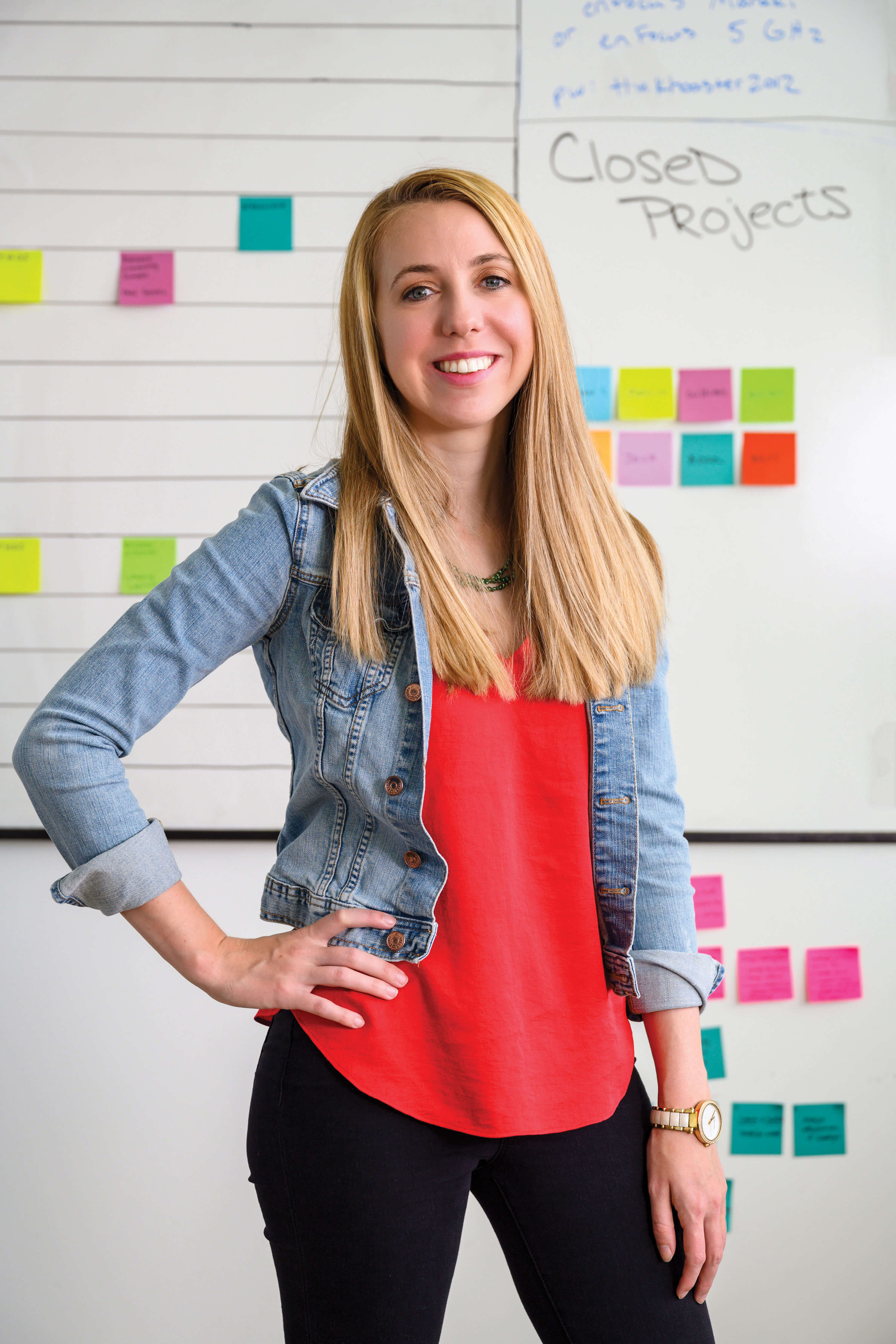
Socializing Medicine
Gillian Shaw’s app takes prenatal care into the digital age.
You might say entrepreneurship runs in Gillian Shaw’s family. Her grandmother opened one of the first nail salons in New Jersey, and her father started his own company on Wall Street.
But it was science—not business—that was on Shaw’s mind as an undergrad. After graduating from Monmouth in 2012 with a degree in chemistry, she earned a master’s in chemistry from the University of Notre Dame. Realizing she didn’t want to spend her life in a lab, she then enrolled in the university’s entrepreneurship in STEM program with a goal of using her science background in combination with new ideas in business to help others.
That’s what she does now as a program director for enFocus, a nonprofit organization in South Bend, Indiana, that works to at- tract and develop entrepreneurial talent across two counties in the state.
“We want to spark innovation and entrepreneurship by pairing young, talented people with meaningful projects in the com- munity,” says Shaw.
While most of Shaw’s time is spent working with budding entrepreneurs on their business plans, her role also gives her time to work on other projects she’s passionate about. In Shaw’s case, that’s an app called Healthy Points, which she co-founded with colleague Andrew Wiand.
Healthy Points empowers at- risk pregnant women to make healthy decisions by utilizing HIPAA-secure technology that allows the women to communicate with each other as well as with health care providers. Users can post photos of them- selves participating in healthy behaviors—like drinking water—and earn points that can be redeemed for items such as diapers and clothing for newborns. As of late August, over 200 people—including patients and health professionals—have utilized the app.
Shaw and Wiand saw a great need to address women’s health during pregnancy, especially the health of at-risk populations, who tend to have more complicated deliveries. According to Shaw, these women—often from low-income, low-education, and socially disadvantaged groups— have traditionally been hard to reach by health systems, in part because they have felt marginalized and underserved, which leads to a mistrust of the medical community. But these women also experience other obstacles that can keep them from engaging in their own health, such as unstable home environments, living in a food desert, or lacking transportation.
“If you put yourself in these women’s shoes,” says Shaw, “you can see how you might make a decision to cancel your doctor’s appointment to pick up an extra shift at work so you can make rent. Or maybe you’ve been evicted, so you place a priority on establishing a safe place to sleep.”
Through Shaw’s app, health care providers can engage these women digitally, and the women themselves can feel empowered to make a healthy change in their lives. During a Healthy Points focus group, Shaw spoke with one woman who saw someone else post about replacing soda with sparkling water.
“And the woman thought, ‘I could do that!’ Seeing the other person’s post enabled her to make a switch as well,” says Shaw. “And when you’re talking about women who are diabetic while they’re pregnant, a soda to a sparkling water is a huge shift. It really makes a big difference.”
For now, Healthy Points has been growing through intro- ductions from current clients. But Shaw hopes to eventually integrate the app with electronic medical records to reduce the burden on physicians, and by doing so, greatly expand its reach to the lives of pregnant women across the United States. “That’s the big vision,” she says. “That might be five or 10 years down the road, but within the next year or two, I hope we can expand our network to all of Indiana.”
Just go for it
As a program director with enFocus, Shaw spends a lot of time with budding entrepreneurs, helping them to write business plans or secure funding for their projects. Her advice if you have your own project that you want to get o the ground? Just go for it.
“One of the things I’ve seen with entrepreneurs is that they’re scared to take that last step,” says Shaw. “But there’s never a case where you 100% know it’s going to work. You’re always taking a little bit of a risk—entrepreneurship is risky. But my advice is to just take the chance. Failure is a success in some ways because you learn a lot. You’ll be OK. I promise.”